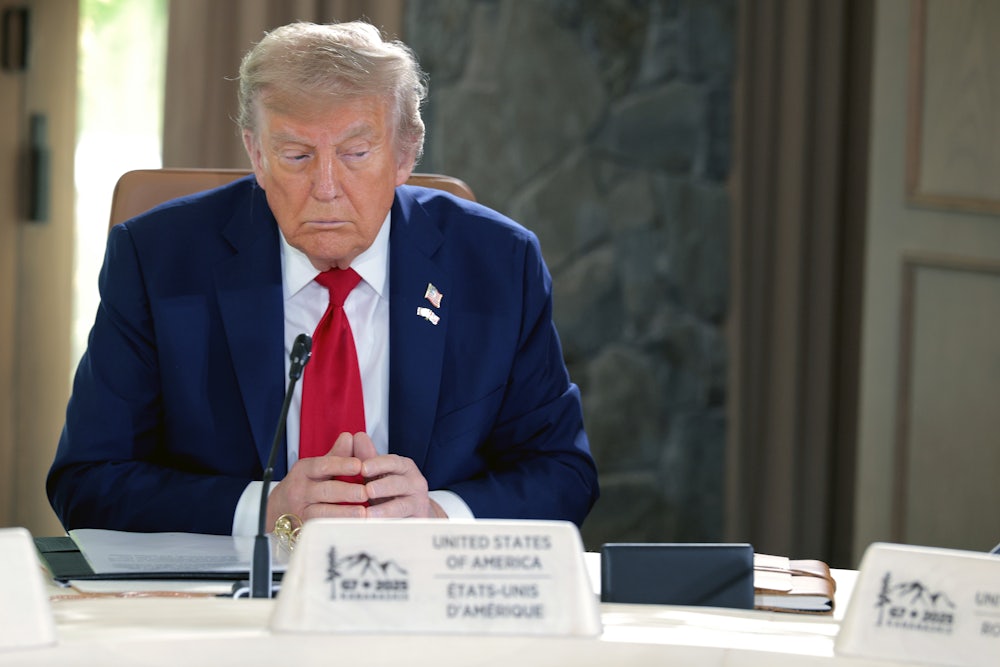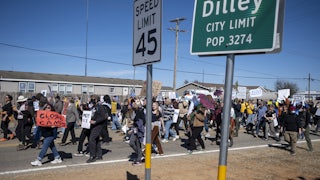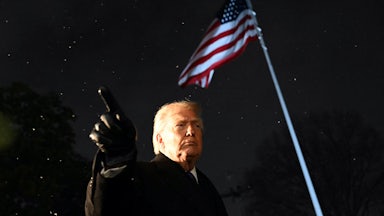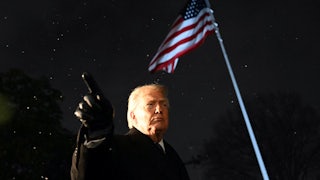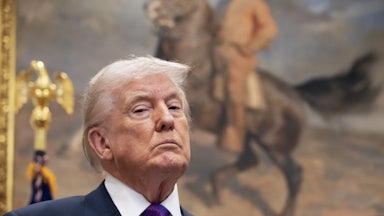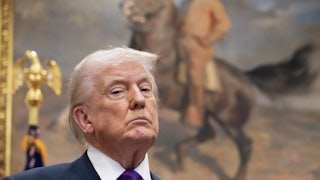If you live in the United States, you are in greater jeopardy today than you were six months ago. So is your family. So are your friends and neighbors.
Virtually all of the most important parts of the U.S. government that were created to protect the U.S. from the greatest risks we face are being shut down, gutted, or marginalized. What is more, plans and statements of the president and his advisers suggest further cuts are contemplated that increase the likelihood that one or more crises will catch us unawares and that when that happens, we will be much less equipped to handle it than we have been in decades.
Our early warning capabilities, our planning tools, our interagency coordinating mechanisms, and the resources available to the government to respond to crises have all been greatly diminished. This will remain true despite planned increases in defense and homeland security spending—especially as those resources are directed at illusory “invasions” and nonexistent “insurrections.” It will remain true despite—and even to a degree because of—costly and distracting displays of military and law enforcement muscle-flexing.
Area after area of the government with responsibility for anticipating, preparing for, and handling major national security threats has been affected. Despite news reports addressing some of these developments individually, the scope of the changes to institutions, personnel, budgets, and policy, and the interrelated and cumulative consequences of those changes, must be better understood and reversed.
This should not be a partisan issue. It impacts red states and blue, Democrats and Republicans, cities and rural areas, rich and poor, all of us. Furthermore, this is not an abstraction. Every area impacted is demonstrably one that recent history has shown should be of urgent concern to us.
At the core of this critical situation is the effective lobotomization of our government’s national security “brain” and “nervous system.” We have not had a dedicated national security adviser to the president since May 1 when Mike Waltz resigned. In the intervening six weeks, this critical role has ostensibly been filled by Secretary of State Marco Rubio. But not only does Rubio have a massively challenging job as secretary of state, he is also serving as interim head of the U.S. Agency for International Development and as acting archivist of the United States—head of the agency responsible for preserving all the government’s records.
None of these tasks is minor. None can be performed on a part-time basis. Although it has been observed that Henry Kissinger once held both the top State and National Security Council positions, that was considered such an error that President Gerald Ford told me when I interviewed him for my history of the NSC, Running the World, that undoing the arrangement was one of his most important decisions as president.
The State Department is undergoing a major reorganization while dealing with the complex and volatile world situation. USAID, a crucial tool of U.S. foreign policy and one with a vital role to play in helping to contain disease and conflict worldwide, is effectively being dismantled. Rubio is also taking on roles that many former secretaries of state did not get deeply engaged in, like determining who should be granted or denied visa status. In addition, his burdens are increased because there is no confirmed U.S. ambassador to the United Nations, and more than 70 other ambassadorial positions remain open.
Rubio simply could not effectively do what he is being asked to do even were he not also being given the most critical national security policy development and coordinating role in the White House. Making matters dramatically more challenging, on May 23, the White House announced the elimination of 100 jobs within the National Security Council, reducing its professional staff to its smallest size in decades. Furthermore, there are credible reports that further cuts are likely, with some estimates suggesting the president is considering reducing the NSC staff to half of its over 350 positions or even further to “just a few dozen people.”
This would make the NSC smaller than it has been in decades. But for an entity that is responsible for monitoring the world and threats to our national well-being and then coordinating the development of policies and the implementation of the plans approved by the president, as big a blow as the cuts are, more important is that the entire NSC process is being marginalized by a president who has repeatedly and recklessly made it clear he does not feel he needs advice.
His refusal to hold regular intelligence briefings and reports of his resistance to consuming written intelligence illustrate this point. So do his decisions to appoint top aides to national security posts like Secretary of Defense Pete Hegseth and Director of National Intelligence Tulsi Gabbard, who are among the least experienced ever to hold their jobs.
As events surrounding the military deployment in Los Angeles illustrate, Trump has sought aides not for their counsel but for the willingness to do unquestioningly what they are told. (This point is supported by contrasting the resistance Trump received from his secretary of defense and chairman of the joint chiefs to plans to deploy the military against Black Lives Matter protests in 2020 with the reflexive support of Hegseth for the legally questionable moves against protesters in California.)
Rubio has indicated that the NSC cuts target it as a stronghold of the “deep state.” But of course, the president can appoint anyone he wants to the NSC staff; therefore, drastically reducing the agency’s role is not the only way of addressing the issue of the loyalties of staffers.
Cuts in its bloated staffing were certainly justifiable. What is not defensible is so drastically weakening the advice available to the president, the quality of that advice, or the ability to coordinate interagency actions in support of presidential decisions.
The diminution of the NSC’s role might not increase the risks faced by the U.S. so drastically if at the same time the NSC was shrunk and sidelined other national security agencies were strengthened—especially those associated with critical crisis areas. But that is clearly not the case either.
Essentially all overseas roles in USAID are being eliminated. The State Department plans to do away with nearly one out of five employees. Thousands are expected to be cut from the U.S. intelligence community.
The president has expressed a desire to disengage from the United Nations and minimize other alliances and international institutions that have played a multilateral crisis management role in the past. NATO in particular, our most important alliance, has been weakened even as the position of our enemies and rivals has been strengthened by changes to our policies and priorities.
The president’s 2026 budgets calls for over $500 million in cuts at the FBI—which plays a crucial role in U.S. counterintelligence activities. Some of the FBI’s most experienced professionals have been removed from their offices. The Department of Justice has cut U.S. efforts to stop foreign interference in our elections.
Chillingly, the government’s main coordinating mechanism with the Department of Homeland Security for managing counterterrorism threats has been downgraded dramatically, with the appointment of a 22-year-old with virtually no experience of any sort to head it.
The president has announced he is considering eliminating the Federal Emergency Management Agency and handling all disaster response decisions personally. The ability to anticipate hurricanes and help people prepare for other environmental disasters will be harmed by cuts to the parts of the National Oceanic and Atmospheric Administration that handle those duties. Even cuts to public broadcasting will make it harder for information about natural disasters to get to rural areas. Elevating individuals who don’t believe in climate science certainly also makes matters worse.
Cuts at the Department of Health and Human Services have hobbled our ability to predict or respond to pandemics or bioterrorism. Cuts to Medicaid will hinder our ability to prevent or respond to disease outbreaks—once again with impact on rural communities being most negative. Programs to develop and promote vaccines that could help prevent such health disasters have been eliminated, as has vital expertise in epidemiology and immunology, among other key areas.
Even the parts of the government that help us avoid and control financial crises have been weakened dramatically, and financial institutions have been given more latitude to repeat past or invent new forms of risky behavior.
Rather than learning from the experiences of our own lifetime, from terror attacks to wars to financial crises to the pandemic, we are actually increasing the chances we relive them or worse in the near future.
We cannot anticipate what will come next. With the volatility in the Middle East at the moment, increasing violent extremism at home and abroad, bird flu, measles and tuberculosis cases regularly being reported, market volatility due to trade uncertainty, and the start of hurricane season, what we do know is that serious risks are everywhere.
But what is clear is that whatever the next crisis may be, we will be less able to handle it, and our citizens, our economy, our allies, and our country will suffer. It is time for the Congress to live up to its oaths and reverse these trends. It is essential voters recognize the dangers that are accruing to their own communities and lives. Furthermore, those who may aspire to be responsible for the national security decisions in any future government should be developing plans over the next couple of years that can be quickly implemented to reverse the damage that is being done to our ability to protect our citizens.
